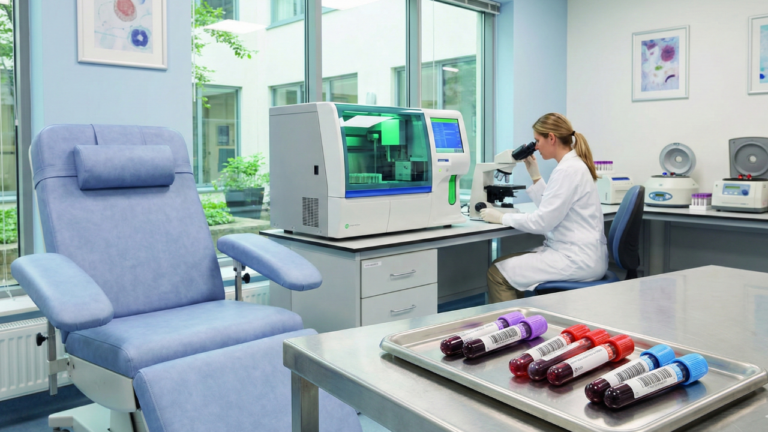Did you know that about half of all pregnancies are not planned? Your body needs proper preparation before trying for a baby, and preconception care gives you that chance. A preconception check-up provides a detailed health and lifestyle assessment before you start trying to conceive. This gives you a head start in your path to parenthood.
Pre-pregnancy care does more than find potential problems. Your body needs the right preparation for this life-changing experience. A basic check-up can reveal hidden issues like vitamin deficiencies, hormonal imbalances, or conditions such as diabetes or thyroid problems. These could affect your fertility or cause complications later. This becomes even more important if you’ve had a premature birth, miscarriage, stillbirth, or a baby with a birth defect. This piece explores everything about preconception care. You’ll learn the best time to start preparing (ideally 3–6 months before trying), necessary tests for both partners, and lifestyle changes that can substantially improve your chances of having a healthy pregnancy and baby.

Why Preconception Care Matters
Preconception care takes a proactive approach to health that helps both partners before pregnancy begins. This care combines medical assessments, lifestyle changes, and educational interventions that build a foundation for a healthy pregnancy.
Benefits of preconception care for both partners
Preconception care brings great advantages that go beyond just the mother. Studies show that male partner involvement in preconception and antenatal care helps improve maternal and child health outcomes. This involvement is vital in countries where males make healthcare decisions for their families. Women’s preconception care helps identify and manage pre-existing conditions like anaemia, thyroid disorders, diabetes, and hypertension before conception. It also deals with nutritional deficiencies, updates vaccinations, and helps with psychological readiness for parenthood.
For men, preconception care can:
- Make reproductive health better through lifestyle changes
- Screen for and treat sexually transmitted infections
- Find potential sperm issues linked to alcohol, smoking, or drug use
Both partners can benefit from genetic counselling to find potential hereditary conditions. Couples who plan pregnancy together tend to seek early prenatal care, and women are less likely to engage in risky behaviours like smoking and drinking alcohol.
How it improves fertility readiness and pregnancy outcomes
Research strongly backs up how well preconception care works. Studies show that promoting health before conception leads to a 39% increase in seeking antenatal care and cuts neonatal mortality by 17%. Early interventions create lasting benefits. Maternal health improves with preconception care, showing a slight decrease in severe maternal health issues overall (adjusted odds ratio 0.97). The results are even better for women with chronic diseases like hypertension, diabetes, or chronic kidney disease. Any preconception care led to much lower odds of severe maternal health problems (adjusted odds ratio 0.84).
Birth outcomes show real improvements. Research showed that women who got preconception care had fewer preterm births (11.18% compared to 14.99% without care) and fewer low-birth-weight babies (9.23% compared to 11.25%). Without intervention, the risk of preterm births was 1.3 times higher. Better coverage and quality of several interventions, including preconception care, could prevent 71% of neonatal deaths (1.9 million), 33% of stillbirths (0.82 million), and 54% of maternal deaths (0.16 million) each year by 2025 in high-burden countries.
Preconception care looks at the time between pregnancies too. The American College of Obstetricians and Gynaecologists (ACOG) suggests waiting at least 6 months after delivery before trying to conceive again. The ideal wait time is 18 months. Pregnancies spaced less than 6 months apart have higher rates of complications. Preconception care gives you and your partner a perfect time to adopt healthy habits that will help both you and your future child. Taking steps to improve your health during this time gives you and your partner the best foundation for creating new life.
Also Read: When to Go for IVF Treatment: Your Step-by-Step Decision Guide
When to Start Pre-Pregnancy Planning
Timing means everything when you’re getting your body ready for pregnancy. The time before conception is a vital chance to work on health factors that could affect your fertility and future pregnancy.

Ideal timeline for preconception checkup
Healthcare experts suggest booking your first preconception checkup at least three months before you try to conceive. This gives you enough time to deal with health concerns, change medications if needed, and improve your lifestyle habits.
Your preconception care should be part of your regular healthcare routine. You can schedule a checkup anytime—even a year before you want to get pregnant. Your healthcare provider might ask “Would you like to become pregnant in the next year?” This helps them give advice that matches your goals. Couples who already have children should still get a preconception check. Your health might have changed since your last pregnancy, which creates new things to think about. This visit also lets you talk about any worries from past pregnancies that might matter this time around.
Special cases: age, chronic conditions, or past pregnancy loss
Personal circumstances change timing needs by a lot. Women 35 or older, which doctors call “advanced maternal age,” should get checked after trying for six months without success. This happens because egg quality goes down with age, affecting both fertility and pregnancy outcomes.
Preconception care is even more important for women with chronic health conditions like diabetes, high blood pressure, thyroid disorders, or autoimmune diseases. These cases might need longer than three months to get health in the best shape before conception. Research shows women with chronic medical conditions who get preconception care are more likely to adopt healthy habits and have better pregnancies.
After pregnancy loss, timing becomes personal. Many doctors used to suggest waiting three months after an early loss before trying again. But newer research challenges this idea. A study of women who had one or two spontaneous losses found higher birth rates in those who waited three months or less, compared to women who waited longer. Doctors usually recommend waiting at least six months after stillbirth. This gives enough time for physical recovery and emotional healing. A preconception checkup provides great support before trying again after any pregnancy loss—helping with both physical and emotional aspects of your path to parenthood.
Essential
Medical tests can give you great insights about your health before you try to get pregnant. These tests help you identify and address any health concerns early in your pregnancy experience.

1. Complete Blood Count (CBC)
A CBC test gives you a complete picture of your blood health and stands as one of the most basic preconception tests. The test looks at different parts of your blood – red blood cells that carry oxygen, white blood cells that fight infection, and platelets that help blood clot.
This test can spot anaemia (low red blood cell count), which many women face during pregnancy. Without treatment, anaemia can leave you feeling tired. Your white blood cell levels might show if you have an infection that needs treatment before pregnancy. The platelet count matters too – low platelets could lead to heavy bleeding during delivery, while high levels might create blood clots that could affect you and your baby.
2. Blood Group & Rh Factor
Your blood type (A, B, AB, or O) and Rh factor (positive or negative) are determined by this test. Your Rh status becomes significant when planning pregnancy. Problems can arise if you’re Rh-negative and your baby gets Rh-positive blood from the father, leading to Rh incompatibility.
Your body might see the Rh-positive blood as a threat and create antibodies to fight it. These antibodies can reach your baby through the placenta and attack their blood cells, which might cause serious anaemia in the foetus. The good news is that doctors can manage this condition with timely Rh immunoglobulin (RhoGAM) shots if they catch it early.
3. Blood Sugar and HbA1c
Blood sugar tests before pregnancy can reveal undiagnosed diabetes or prediabetes. The HbA1c test shows your average blood glucose levels in the last three months. The ideal target HbA1c level should stay below 48 mmol/mol (or 6.5%) when planning pregnancy. Doctors strongly suggest waiting to conceive if your HbA1c is very high (above 86 mmol/mol, or 10%). Even small improvements in your levels can help reduce pregnancy complications.
4. Thyroid Function Test
Thyroid hormones are vital for controlling metabolism, which affects both fertility and pregnancy outcomes. A blood test measures your Thyroid Stimulating Hormone (TSH) to check how well your thyroid works. Thyroid problems, whether too high or too low, can disrupt ovulation, raise miscarriage risk, and impact how your baby develops. Getting your thyroid issues under control before pregnancy is essential for both you and your baby’s health.
5. Rubella and other immunity tests
A rubella antibody test shows if you’re protected against this infection through previous vaccines or exposure. Getting rubella while pregnant, especially in the first three months, can cause serious birth defects including hearing loss, vision problems, heart defects, and developmental issues. You should get the rubella vaccine at least a month before trying to conceive if you’re not immune, since you can’t receive this live vaccine during pregnancy. Your doctor might also want to check if you’re immune to chickenpox, as this infection can risk your baby’s health during pregnancy.
6. Pap Smear and Pelvic Ultrasound
A Pap test checks your cervical cells for cancer-related changes. Women should start getting Pap tests at age 21 and continue every 2-3 years. Getting this done before pregnancy lets you handle any issues that come up without waiting until after delivery. A pelvic ultrasound looks at your reproductive organs – uterus, ovaries, and fallopian tubes. This scan can find problems like fibroids, cysts, or other issues that might affect your ability to get pregnant or carry a baby. Women with irregular periods can learn about their ovulation patterns, which helps them know the best time to try for pregnancy.
Preconception Test for Men and Couples
Male fertility is just as vital for conception success. In fact, about half of infertility cases come from male factors, which makes preconception testing a significant step for both partners.
Semen analysis and hormone testing
Semen analysis is the life-blood of male fertility testing. This test looks at several key factors:
- Sperm count (normal range: 15-259 million per millilitre)
- Sperm movement (motility should exceed 40%)
- Sperm shape (at least 4% should have normal morphology)
- Semen volume (typically 1.5-7.6 millilitres)
Blood tests can show hormone imbalances that affect sperm production. These tests check testosterone levels, follicle-stimulating hormone (FSH), luteinising hormone (LH), and other hormones needed for reproductive health.
STI screening for both partners
Untreated sexually transmitted infections can affect fertility by a lot. Chlamydia often shows no symptoms but can cause male and female infertility plus pelvic inflammatory disease when left untreated. Both gonorrhoea and syphilis can lead to serious complications, including miscarriage.
Genetic disorder screening based on family history
Genetic counselling becomes especially important when you have:
- A known genetic abnormality
- Family members with genetic conditions
- Ethnic background with increased risk for certain disorders
Genetic screening helps identify potential carriers. This allows couples to discuss options to prevent transmission to their child.
Lifestyle and Nutrition Before Pregnancy
Your body’s nutritional and physical preparation is the life-blood of preconception care. Positive lifestyle changes made at least three months before trying to conceive create the best environment for conception and early foetal development.

Folic acid and prenatal vitamins
Taking folic acid supplements plays a significant role. You should take 400 micrograms daily at least one month before conception through the first 12 weeks of pregnancy. This B vitamin reduces the risk of neural tube defects. Your doctor might recommend a higher dose of 4 milligrammes if you’ve had a child with such a defect. Prenatal vitamins provide many more nutrients beyond folic acid. These include iron to prevent anaemia, calcium for bone development, vitamin D (10 micrograms daily recommended between September and March), and DHA for brain development.
Weight, exercise, and stress management
A healthy weight improves fertility readiness. Both underweight and overweight conditions can affect your chances of conception and pregnancy outcomes. You want to get 150 minutes of moderate physical activity weekly through brisk walking or cycling. Moderate activity helps women get pregnant faster, while excessive high-intensity exercise might delay conception. On top of that, good stress management improves hormone balance since cortisol can interfere with reproductive hormones.
Avoiding alcohol, smoking, and harmful substances
Stop alcohol consumption completely when trying to conceive because it affects hormone levels, menstruation and ovulation. Smoking and secondhand smoke exposure raise risks of premature births and low birth weight. Stay away from environmental toxins like lead, pesticides, and harmful chemicals that could affect developing foetuses negatively.
Conclusion
Getting your body ready for pregnancy is one of the most significant steps you can take to ensure a healthy future for you and your baby. In this piece, we looked at how preconception care gives you a detailed approach to planning parenthood. The ideal time to start is 3-6 months before trying to conceive.
Your health before pregnancy plays a huge role. Preconception checkups spot potential problems early and give you time to address them before conception. On top of that, these visits let you talk about any worries from previous pregnancies or your family’s medical history that might affect your approach. Both partners have key roles in getting ready. Women need essential tests like complete blood counts, thyroid function assessments, and immunity screenings. Men should get semen analysis and hormone testing to check their fertility. Couples should also get STI screening and genetic testing based on their family history.
The lifestyle changes you make during this time can improve your chances of a healthy pregnancy by a lot. Daily folic acid supplements, a healthy weight, and moderate exercise help create the perfect environment for conception. Just as important, cutting out alcohol, tobacco, and environmental toxins protects your reproductive health and your future baby’s growth.
Note that preconception care isn’t just about finding problems it enables you with knowledge and tools to start your experience on the strongest possible foundation. About half of all pregnancies aren’t planned, but you now have what you need to make conscious, informed choices about your reproductive health. Time spent on preconception care ended up reducing pregnancy complications, creating healthier birth outcomes, and giving you peace of mind. Think over this preparation period as a gift to yourself and your future child showing your steadfast dedication to parenthood even before conception starts.
Key Takeaways
Preparing for pregnancy isn’t just about conception—it’s about creating the optimal foundation for both fertility and healthy pregnancy outcomes through strategic preconception care.
- Begin preconception planning 3-6 months before trying to conceive to address health issues and optimise fertility readiness.
- Essential tests include blood counts, thyroid function, immunity screening, and genetic testing based on family history for both partners.
- Start taking 400 micrograms of folic acid daily at least one month before conception to prevent neural tube defects.
- Maintain healthy weight, exercise moderately, and eliminate alcohol and smoking to improve conception chances and pregnancy outcomes.
- Both partners need preconception care—male factors contribute to about half of all infertility cases requiring attention
Studies show that proper preconception care can reduce preterm births by 39% and neonatal mortality by 17%, making this preparation period one of the most impactful investments in your future family’s health.
FAQs
Q1. How long before trying to conceive should I start preconception care? It’s recommended to begin preconception care at least 3-6 months before attempting to conceive. This timeline allows sufficient opportunity to address any health concerns, adjust medications if needed, and make beneficial lifestyle changes.
Q2. What are the most important preconception tests for women? Essential preconception tests for women include a Complete Blood Count (CBC), Blood Group & Rh Factor test, Blood Sugar and HbA1c test, Thyroid Function Test, Rubella immunity test, and a Pap Smear with Pelvic Ultrasound.
Q3. Why is folic acid important before pregnancy? Folic acid is crucial before pregnancy as it significantly reduces the risk of neural tube defects in the developing foetus. It’s recommended to take 400 micrograms daily at least one month before conception and throughout the first 12 weeks of pregnancy.
Q4. Should men also undergo preconception testing? Yes, men should undergo preconception testing as male factors contribute to about half of all infertility cases. Important tests for men include semen analysis and hormone testing. Both partners should also consider STI screening and genetic testing based on family history.
Q5. What lifestyle changes are important when preparing for pregnancy? Key lifestyle changes include maintaining a healthy weight, exercising moderately (aim for 150 minutes weekly), managing stress, avoiding alcohol and smoking, and eliminating exposure to harmful environmental toxins. These changes can significantly improve fertility and pregnancy outcomes.
Disclaimer: This article is for informational purposes only and does not constitute medical advice. Always consult with a qualified healthcare provider for personalised guidance regarding fertility treatments





